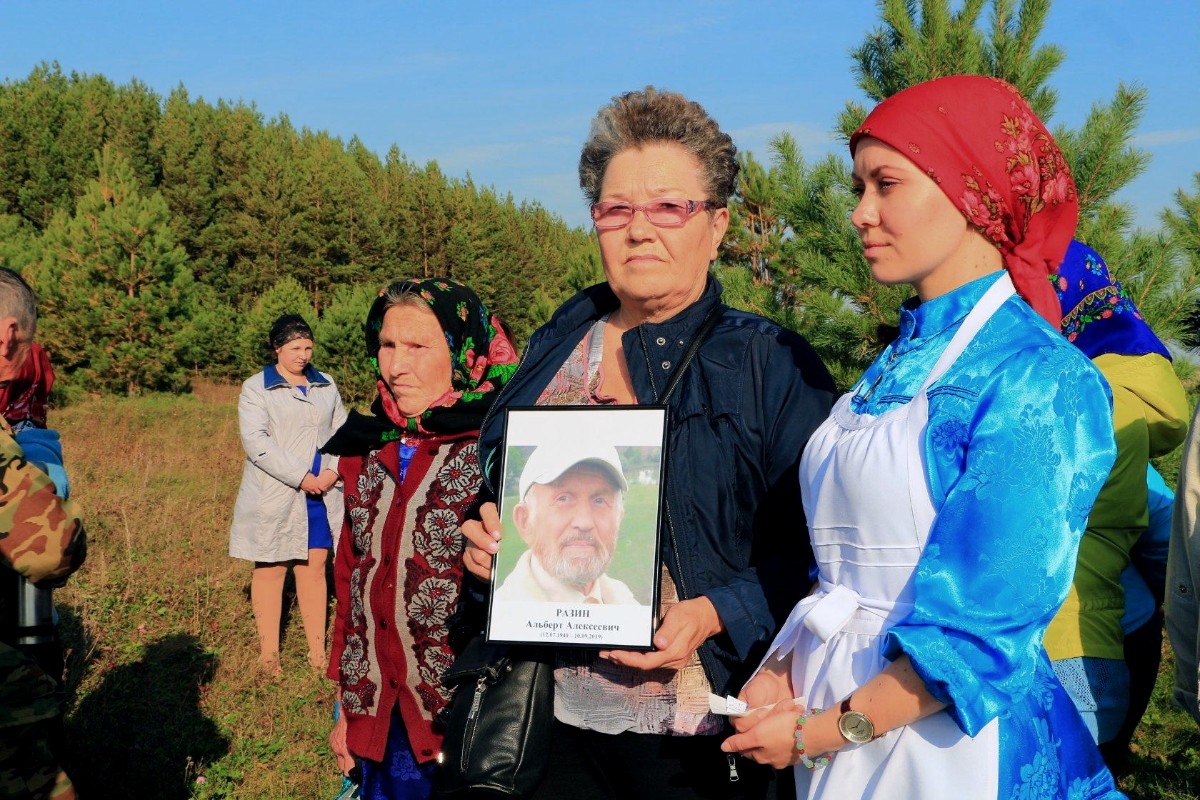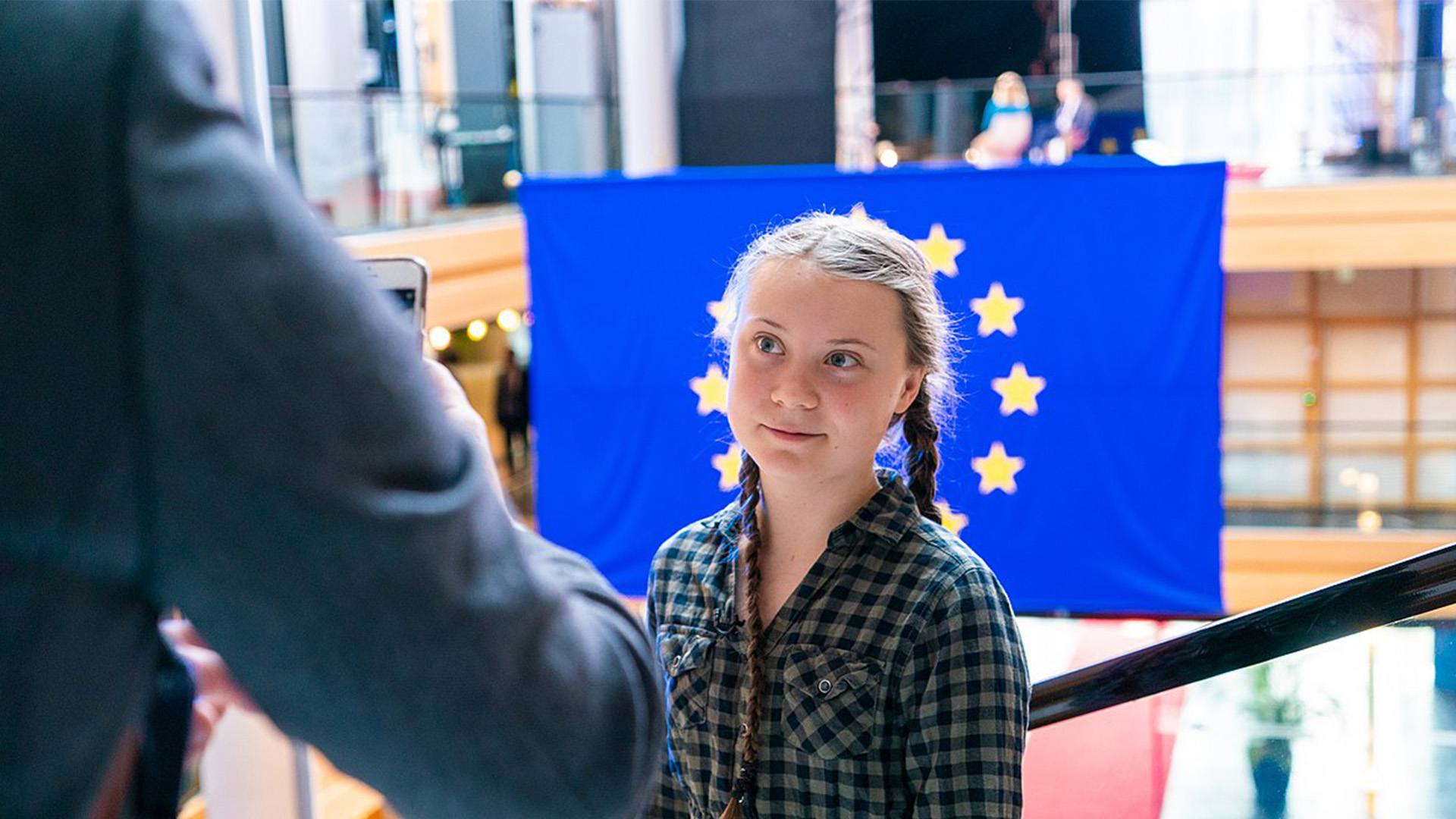On 10 September 2019, 79-year old sociologist Albert Razin set himself on fire in the centre of the Russian city of Izhevsk, capital of the Udmurt Republic. Razin was an Udmurt language rights activist; his act of self-immolation was the culmination of years of protests against Russia’s language policies that he believed led to the Russification of the Udmurt people and their consequent loss of ethnic distinctiveness.
On the same day, UK Prime Minister Boris Johnson suspended the British parliament for five weeks. Johnson’s critics protested his decision, saying that he aimed to stifle the parliamentary debate about Brexit, as Johnson was determined to lead the country out of the EU with or without a ‘divorce deal’ on 31 October.
Just as Albert Razin committed suicide and Boris Johnson tried to push his country towards what Conservative MP Jeremy Hunt called ‘political suicide‘, environmental activist Greta Thunberg was touring the US, – a tour that reached its climax with her address to the United Nations Climate Action Summit on 23 September: ‘People are suffering. People are dying. Entire ecosystems are collapsing. We are in the beginning of a mass extinction. And all you can talk about is money and fairy-tales of eternal economic growth. How dare you!’.
They may seem like random examples, they have an important element in common: they are all manifestations of political ‘immortalism’.
Transcending death through ‘hero-systems’
In 1973, around three months before his untimely death, cultural anthropologist Ernest Becker published his Pulitzer Prize-winning book The Denial of Death. In this book, Becker discussed a ‘terrifying dilemma’:
‘Man is literally split in two: he has an awareness of his own splendid uniqueness in that he sticks out of nature with a towering majesty, and yet he goes back into the ground a few feet in order blindly and dumbly to rot and disappear forever’.
In other words, like all other animals, humans have an instinct for self-preservation, and yet, unlike all other animals, we are aware of our own mortality. This combination has the potential to produce a paralysing existential horror in human minds. To avoid this paralysis, people develop various immortality projects, or hero-systems, that help us deny our mortality.
Hero-systems can be magical, religious, secular or scientific, but all of them are designed to make us feel ‘heroic’, bigger than our physical selves, more significant than mere ‘meat bags’ doomed to decay and decomposition. In the West, religion has, arguably, been the longest operating immortality project. Starting from animistic beliefs through Greco-Roman, Germanic, Celtic, and other polytheistic faiths to Christian monotheism, all such systems have promised that our spirit or soul will survive our physical deaths, even if they will be damned to unending suffering in Hell.
But religion is not the only immortality project. Many people believe they can transcend after their own deaths through a biological family. The idea is that humans continue the lives of their parents and grandparents and will keep on living through their children and grandchildren. Others trust that their legacy provides a path to symbolic immortality, that creating things like works or art or literature, making scientific discoveries, will be embedded in the collective memory, ensuring their remembrance long after they are long gone. And if one looks at how densely Western squares, streets, libraries, and museums are populated with immortal heroes of the past – philosophers and poets, conquerors and tyrants, artists and architects, doctors and scientists – one will see that there is plenty of evidence that the argument about legacy as investment in immortality makes perfect sense.
There are other ways to ensure symbolic immortality. As Becker put it, as he was preparing for his demise from cancer in a Canadian hospital,
‘we build character and culture in order to shield ourselves from the devastating awareness of our underlying helplessness and the terror of our inevitable death. Each of us constructs a personality, a style of life or […] a character armor, in a vain effort to deny the fundamental fact of our animality. We don’t want to admit that we stand alone. So we identify with a more powerful person, a cause, a flag, or the size of our bank account’.
Indeed, as the age of Enlightenment, the French Revolution, and Darwinism seriously undermined Christianity in the West and, for many, subverted the religious paths to immortality, secular hero-systems started to play a more significant role. One is the survival through the ‘extended family’ of the nation, or, in Becker’s words, ‘a flag’. A strong national identification entwines a person into the nation’s past, present, and future, allowing people to live, even after their physical death, as long as their nation does.
Heinrich Himmler, the infamous leader of the SS, offered a telling example of how the concepts of family and nation with a shared past and future form a complex yet coherent racist narrative of immortality:
‘We shall be unconquerable and immortal as a nation, truly immortal as an Aryan-Nordic race, if we hold firm by selection to the law of blood and, maintaining the cult of our ancestors […] A nation that preserves its ancestors will always have children; only nations without ancestors are childless’.
And Himmler’s friend, Hanns Johst was straightforward in explaining the purpose of the SS as a quasi-religious organisation: ‘The order serves and this service guarantees the immortality of Adolf Hitler and his will’.
Political immortalism, ethnicity and empire
Before setting himself on fire, Udmurt sociologist Albert Razin held two posters. One asked ‘Do I have a Fatherland?’ The other read: ‘If my language dies tomorrow, then I’m ready to die today’, a line from a poem the Soviet-Dagestani poet Rasul Gamzatov, dedicated to the life-giving qualities of his native Avar language. In his poem, Gamzatov had a dream about his own death from a gunshot. He lamented that nobody knew he was dying or would mourn him, as he had ‘no mother, no friend and no lover’. But, as he lay dying on the ground expecting to ‘become dirt himself’ (and possibly recognising that he had no offspring to grant him symbolic immortality), he heard two people talking in Avar language. Hearing some trifling chat in his mother tongue made him feel better, and he started to recover. While realising that his native language could heal him, the poet wondered whether he was ‘one of the last authors who wrote and sang in Avar’. This question terrified him, hence his readiness to die if his language ceased to exist.
The decline of a language that is one of the main markers of identity is a direct challenge to the hero-system based on the pursuit of immortality through a national community – ‘a Fatherland’, as Razin wrote on one of his posters. For people like him, an endangered language is not just a bureaucratic classification – according to UNESCO, the vitality status of Udmurt language is ‘definitely endangered [by extinction]’ – and is not a threat to physical life, but a harbinger of permanent death without afterlife. As he fought for the increase of the number of native Udmurt speakers (or, at least, against its decrease), Razin aspired to ensure his personal symbolic immortality that depended directly on the physical existence of people who would speak his mother tongue.
Yet if Razin protested against Russia’s official language policies that, in his opinion, led to the destruction of his people, eroding the psychological armour that shielded him from the dread of mortality, why would he commit suicide?

Commemorating Albert Razin. Photo via Free Idel-Ural civil movement.
The social psychologists who developed the ‘Terror Management Theory’ demonstrate that, in order to enjoy protection from the terror of death provided by any of the hero-systems (or cultural worldviews, as they put it) people need self-esteem. They need to feel that they meet the standards of value of their cultural realities. Putting this another way, it is not sufficient to write novels – one needs to know that we are actually good at it.
Terror Management researchers also show that ‘death fears contribute to suicidal acts when they can be viewed as heroic efforts to serve one’s god or country’. This can help explain Razin’s suicide: his need for self-esteem as the defender of his native Udmurt language pushed him to commit the ultimate act: sacrificing his physical life for the survival of his people and, hence, for his symbolic immortality. He set a high standard, and martyrdom for the cause became for him the only means to escape the soul-chilling terror of permanent death manifested through the death of the Udmurt language.
Razin thought language was endowed with qualities that could humanize or dehumanize people. His letter to the members of the State Council of the Udmurt Republic, sent three weeks before his death, reads that a ‘Russified Udmurt’ is ‘a bearer of no ethnic culture, does not know any traditions, customs, rites, proverbial wisdom, folk songs or dances’ – they are ‘a robot-like outcast’. And this implies that as a culturally inanimate, dehumanized subject, the Russified Udmurt cannot lay claim to symbolic immortality.
Razin’s ethno-nationalist immortalism clashed, however, with its Russian imperialist counterpart, epitomized in Pushkin’s interpretation of Horace’s ‘Exegi monumentum aere perennius‘ (‘I have created a monument more durable than bronze’). Following Horace’s evaluation of his own poetic legacy, Pushkin repeated his claim – ‘I shall not wholly die’ – as he assumed his soul would outlive his dust and escape corruption in his ‘sacred lyre’. Pushkin thus stressed that the fact that he would be remembered after his death provided him with symbolic immortality.
However, Pushkin linked his immortality project not only to his fame, but the existence of the Russian Empire and dominant status of the Russian language in it. Elaborating on his own remembrance, Pushkin wrote:
I shall be noised abroad through all great Russia,
Her innumerable tongues shall speak my name:
The tongue of the Slavs’ proud grandson, the Finn, and now
The wild Tungus and Kalmyk, the steppes’ friend.
In poetic Russian language, ‘tongue’ – apart from its meaning as a synonym of ‘language’ – also means ‘nation’. Hence, Pushkin hoped that not only Russians, but all the nations colonized by the Russian Empire would know him, be able to read his poems in Russian and, thus, provide him with an even more secure sense of immortality.
This line of reasoning constitutes the core of imperial immortalism. While ethno-nationalists imagine transcending their physical deaths through their ethno-cultural communities, these visions are insufficient for imperialists, who feel the need to prove the viability of their immortality projects through their nation’s domination over other nations.
This is an example of the extreme side of political immortalism: for one’s hero-system to be forceful and potent, serving as the ironclad shield against permanent death, it sometimes needs to subdue competing cultural worldviews. The thought that all hero-systems may be equal undermines faith in one’s own cultural worldview. It is therefore hardly surprising that Himmler, who claimed that the immortality of the Aryan-Nordic race could only be secured through ‘the law of blood’ and the cult of ancestors, was also one of the main architects of the Holocaust.
Identity Rebellion
Since the start of the refugee crisis in Europe, mainstream media outlets have wondered why central and east European states so forcefully resist migration. The question is underpinned by rational and pragmatic deliberations. Central and eastern Europe is facing a demographic decline driven by low and negative net birth rates and outward migration to more prosperous western and northern Europe. This, in turn, shrinks the domestic labour force, increases demands on health care and pension systems, and deteriorates living standards. One pragmatic solution is, therefore, the liberalization of immigration laws, especially for skilled workers. Yet, contrary to rational approaches, central and east Europeans still do not welcome migrants. Some commentators find roots of this resistance in fears that non-European migrants would undermine the host country’s national and cultural identity. Others speak plainly of irrational xenophobia or racism as the main motives.
Theory on immortality projects can offer a different explanation. Large segments of societies that can boast neither power nor affluence, nor showcase artistic accomplishments in arts or socio-cultural leadership. Imagine these societies live with demographic decline: families having one child or none at all and skilled neighbours find jobs in the West and move there with their families. For many in these societies, religion and/or nation may be the only available hero-systems that offer symbolic immortality. And these very cultural worldviews are seen as being threatened by migrants who speak foreign languages and espouse foreign religious values.
Demographic decline is a disturbing reminder of mortality, provoking – especially when self-esteem is low – an increased opposition towards the presence and influence of ethnic, cultural, and/or religious out-groups, as well as a desire to punish those members of their own national community who are seen as its ‘traitors’.
The most extreme example of this effect is the notorious ‘Great Replacement’ conspiracy theory. According to this, the treacherous elites are deliberately replacing native white Europeans with non-white and non-Christian populations, thus subverting Europeans’ pathways to symbolic immortality through an ethnically homogenous nation. Terrorist attacks informed by this idea can be directed either against representatives of those apparently non-European groups or the ‘treacherous elites’. For example, the German neo-Nazi terrorist cell National Socialist Underground killed people of foreign origin, while the infamous Norwegian neo-Nazi Anders Breivik murdered dozens of fellow Norwegians from the Labour Party who he blamed for encouraging the replacement of their countrymen by non-European Muslims.
Breivik’s ‘manifesto’, much of it plagiarised from pieces by other like-minded individuals, revealed that he was influenced by blogger Peder Jensen (AKA Fjordman), a promoter of the Great Replacement conspiracy. One of his foci has been the EU which is, he suggested, ‘deliberately destroying the cultural traditions of member states by flooding them with immigrants and eradicating native traditions’. And it is especially Muslim immigration that, for Jensen, poses a mortal danger to European nations, and because the EU is ‘the principal […] motor behind the Islamization of Europe’, the only way to stop it ‘is to get rid of the EU’. Jensen admits that this would destabilize Europe, but ‘the choice is between a period of painful years in which most of Europe prevails, and death, where Europe simply ceases to exist as a Western cultural entity’.

The Three Brexiteers, street art by Subdude in Shoreditch. Photo by Duncan C from Flickr
Britain’s 2016 decision to leave the EU can be seen as an attempt to move away from its ‘devitalising’ structures. It is no coincidence that a British journalist Douglas Murray, author of The Strange Death of Europe, argues that Europe is ‘committing suicide’ by allowing non-European mass migration and not producing enough children, is also an ardent Brexit supporter. The first official poster of the Vote Vote Leave campaign insinuated that the EU was draining life from British people: ‘Let’s give our NHS [National Health Service] the £350 million the EU takes every week’.
The Vote Leave campaign did not simply lie about the EU. Rather its leaders deliberately associated the EU with death, exploiting mortality anxiety for their own political ends. In one leaflet, the campaign also linked the £350 million sum to cancer, which accounts for more than a quarter of all UK deaths; in another it was linked to EU immigration that ‘put pressure on the NHS’, prophesising that it would ‘only get worse’ if Britain stayed in the EU, because ‘more countries including Serbia, Albania and Turkey [were] set to join’.
Bringing the problem of immigration – especially from predominantly Muslim countries such as Albania and Turkey – into the debate, coupling the ‘life-draining’ narrative of the nature of the EU with a soft version of the Great Replacement conspiracy theory, was perhaps the perfect pitch of pro-Brexit activism. It was hardly incidental, either. As prominent Brexiteer Nigel Farage explained, ‘the goal was to get into people’s heads that immigration and Europe are the same thing and that we are impotent’.
Farage clearly reached this goal. Within a month of massive anti-EU campaigning, concerns with immigration, long seen as the most important issue facing Britain, rose by ten per cent. After the referendum, British sociologists revealed that immigration was at the heart of the vote, finding that older and more authoritarian voters were much more inclined to vote to leave than younger and more liberal Britons.
This makes perfect sense: younger people have their whole lives ahead of them, so they are less vulnerable to reminders of mortality. For older people, ‘many sources of self-esteem are no longer available’, and they are more likely to perceive ethnic and cultural out-groups as threats to their symbolic immortality. Understandably, authoritarians have more negative evaluations of immigrants, but ethno-nationalists and conservatives are not the only ones who sometimes exploit intrinsically human mortality anxiety for their political ends.
Generation Extinction
In January 2019, climate activist Greta Thunberg delivered a speech at the World Economic Forum, warning the audience that ‘financial success [had] come with an unthinkable price tag’ in terms of the impact on the environment. She called upon economic leaders to carry out ‘unprecedented changes in all aspects of society’ before it is too late. ‘I don’t want you to be hopeful, I want you to panic. I want you to feel the fear I feel every day, and then I want you to act’. But what fear does Thunberg feel every day? She gives the answer in the same speech: ‘Either we choose to go on as a civilization or we don’t. That is as black or white as it gets. There are no grey areas when it comes to survival’.

Greta Thunberg at the EU Parliament. Photo by European Parliament from Wikimedia Commons
For people like Thunberg, the driving force behind their activism is none other than fear of death – a theme that runs through all of her speeches. ‘We are in the midst of the sixth mass extinction, and the extinction rate is up to ten thousand times faster than what is considered normal’, Thunberg told Members of the European Parliament in April 2019. In her message to the UN Climate Action Summit in September 2019, she said that ‘People are dying. Entire ecosystems are collapsing’.
The radical environmental movement Extinction Rebellion even features an obvious mortality reminder, and co-founder Gail Bradbrook echoes Thunberg’s ‘black or white’ narrative when she says that ‘We really are at a crossroads. What we choose to do today is the difference between life and death on Earth’.
Unlike the hero-systems based on pursuing immortality through national, ethnic, or racial community, that of climate activists promises symbolic immortality through the survival of humankind, hence Thunberg’s frequent uses of terms ‘species’ and ‘Homo sapiens’. Thus, humanity itself is perceived as an extended family and its vitality functions as a shield against the mortal dread. While ethno-nationalists and conservative populists need to deal with the fear of permanent death presumably resulting from imperialist policies or a Great Replacement, climate activists fear extinction of life as such.
Despite the obvious difference between the ‘extended family’ of ethno-nationalists and climate activists, the latter identify individual worth on peoples’ contribution to human survival. Roger Hallam, yet another co-founder of Extinction Rebellion, makes this point clear: ‘In the end we have to realize that we will all be alone on our deathbed and asking ourselves whether we lived a worthwhile life – and for this generation the climate crisis is the overriding existential challenge’. Bradbrook conveys a similar message: ‘The idea is – in other cultures, in indigenous cultures – is that the ancestors are honoured. Those who went before – they stood out for life, they did things for life, and you know that you’ve got several generations in front of you’.
Climate activists understand the emotional power of mortality reminders and willingly exploit them for their political goals. This is particularly evident in the description of recruitment strategies of Extinction Rebellion explained by Hallam: ‘So it goes like this: you go into Town Hall X, you tell them that it’s, you know, effectively over, we’re all gonna die, unless there’s a major mobilization’.
Rejection
Ironically, it is exactly climate activists’ death narrative that turns many people off their message, for two reasons. First, unwelcome and insistent reminders of mortality repel people. They will prefer to block the entire message because it is framed by existential horror. They will derogate the messenger to delegitimize the source of terrifying reminders. This is why Thunberg is dismissed – predominantly by middle-aged white men – as a ‘mentally ill child’ or, as one pro-Brexit journalist put it, ‘a millenarian weirdo’.
Second, climate activists’ death narrative clashes with that of conservative populists, despite their rhetorical similarities. Ethno-nationalists tend to divide people into in- and out-groups; denial of death produces a cleavage between two types of demise: our death (which can be transcended and therefore not real) and theirs, permanent and ultimately negligible. This cleavage produces the distinction between ‘us’ (real humans) and ‘them’ (easily dehumanized), like Razin’s Russified Udmurt, a ‘a robot-like outcast’.
The idea of human extinction pushed by climate activists threatens the ownership of ‘our’ death as it implies the collectivisation of the demise, which subverts the ethno-cultural hero-system. Ethno-nationalists rightly suspect that this implies the elimination of national borders since, if extinction threatens us all (if we are in this together) then there can be no us/them. This violates the worldview that helps these groups resist mortal dread.
The death narrative can be useful for mobilizing and recruiting supporters but, at the same time, as communication scholars argue, ‘framing global warming as an apocalyptic event […] posits the issue of global warming as extra-human, driven by cosmic forces, and, as such, Fated’ which predictably ‘alleviates humans of responsibility for creating, or at least contributing to, climate change; and decreases the sense of human responsibility for combating global warming’. In other words, the extinction frame undermines the very essence of Thunberg’s message – that humans can somehow correct their mistakes. This frame also ‘invites naysayers to discredit scientists as false prophets and label environmentalists as alarmists. […] Ultimately, such a discourse polarizes readers, who are forced to choose sides because they were not given more nuanced options for addressing the issue’. Thus, the death narrative inherent to climate activists’ political immortalism weakens the environmentalist discourse. If climate change requires collective awareness and action, it is absurd to create a rhetorical framework that antagonises a significant number of people.
Blood, soil, and wind
In 1845, Ukrainian poet Taras Shevchenko, a citizen of the Russian Empire who promoted the independence of Ukraine, wrote a poem called Testament, in which he asks to be to buried in his ‘beloved Ukraine’. Since Ukraine was not independent, he also called on his fellow Ukrainians to rise up, break their chains, and water their freedom with the blood of the enemy. To ensure his own symbolic immortality through this extended family, he finally asked:
And in the great new family,
The family of the free,
With softly spoken, kindly word
Remember also me.
Shevchenko was not the only poet who wanted to form an intimate link between his dead body and his native land, trampling death by merging with previous generations. Rasul Gamzatov also asked to be buried in his native Dagestan and be remembered by his fellow countrymen with words in Avar language. Irish writer Thomas Davis, a 19th century Irish nationalist, craved to be buried ‘on an Irish green hillside, or an opening lawn – but not too wide’. Likewise, he entrusted his symbolic immortality to his national community to break free from fear of death:
Be my epitaph writ on my country’s mind,
‘He serv’d his country, and lov’d his kind’.
Oh! ‘twere merry unto the grave to go,
If one were sure to be buried so.
Before Davis described how he would like to be laid to rest, he explained how and where he would not want to be buried. In particular, he was unwilling to be buried in Italy or Greece; he loathed the idea of his body being eaten by wild animals or flung into a mass grave of those fallen in battle and was reluctant to have his ashes ‘career on the world-seeing wind’. Apparently, none of these options promised symbolic immortality to Davis compared to with the prospect of being buried in his native land.
During his life, cremation was illegal in Ireland, but it was hardly this that repulsed Davis. At that time, cremation was associated with heathen, pre-Christian practices, secularism that denied the physical resurrection of the body, and burning heretics at the stake. Apparently, for Davis, scattering his ashes in the ‘world-seeing wind’ was also antithetical to becoming part of the native land. If coalescing with the native land resulted in immortality through the vitality of the nation, then dissolving into the air was a spectre of permanent death. It would have been a drama to become part of cosmos – a condition that Mary Elizabeth Frye, in contrast, praised in her most famous poem:
Do not stand at my grave and weep
I am not there. I do not sleep.
I am a thousand winds that blow.
I am the diamond glints on snow.
I am the sunlight on ripened grain.
I am the gentle autumn rain.
Davis rejected universality because it fractured his psychological armour. He was, indeed, no citizen of the world: ‘the cosmopolite is unnatural, base – I would fain say, impossible. To act on a world is for those above it, not of it. Patriotism is human philanthropy’. This again shows us that ownership of our death often results in denying humanness to them.
It is hardly a coincidence that conservative journalist David Harsányi invoked paganism in his criticism of Greta Thunberg and ‘millions of other indoctrinated kids her age’: ‘We’ve failed her by raising a generation of pagans who’ve filled the vacuum left by the absence of faith, not with rationality, but with a cultish worship of Mother Earth and the state’. Climate activists argue that climate change concerns everything and everyone, which can be seen as neo-pagan nature worship. While some of these beliefs also endorse nativism (or ethno-nationalism), others embrace universality and biological holism. This, coupled with the extinction narrative, which antagonises conservatives, specifically because it insists on human creatureliness – a strong reminder of mortality. Terror Management researchers argue that ‘people are motivated to distance themselves from other animals because of the association between death and our animal nature’. This may explain why conservatives prefer to distance themselves from the climate change discourse.
The extremes of rightwing political immortalism are divisive, but so are those of the left. While repelled by the immortality projects of the other, both sides weaponize human existential dread by packaging it in the terms of their political agendas. Nevertheless, it would be disingenuous to draw a moral equivalence between the two. Nativists may, in their most radical form, turn genocidal – something one can hardly expect even from more extreme environmental activists.
However, the bad news for those who fear the rise of nativist populism is that they will not find answers in their own sense of moral superiority or sermons of tolerance. They are not fighting the power of intolerance and hate, but the existential dread of those whose psychological defences are so weakened that they would go to any lengths to alleviate it. Self-righteousness is the least useful approach to deal with this.









